Combat medics called to fight COVID-19 in New York City: 'Here, we’re the infantry'
Military members left their families behind to answer the call for help in NYC.
Army Col. Edward Ramirez, who has 27 years of service as a combat medic under his belt, never expected his next deployment to take him to New York City as it became the epicenter of the nation's COVID-19 outbreak.
"It's not bullets. It's not missiles or bombs. But the threat to life [from the coronavirus] is just as much, if not more," Ramirez told "Nightline."
Having just returned from a months-long deployment in Kuwait, Ramirez kissed his family goodbye and boarded a cross-country flight to the Bronx, one of the city's five boroughs, where medical teams were overwhelmed in a losing battle against a silent killer.
Watch the full story on "Nightline" TONIGHT at 12:05 a.m. ET on ABC
"When you're a medical person or a physician, you're not on the very front of the war. They bring the casualties back so the threat is less," he said. "Here, we're the infantry."
Ramirez is one of thousands who answered the call from a city in crisis – combat medics deployed to the epicenter of a new kind of war. Today, they carry the scars of a hard-fought battle, ready and willing to answer the call yet again.
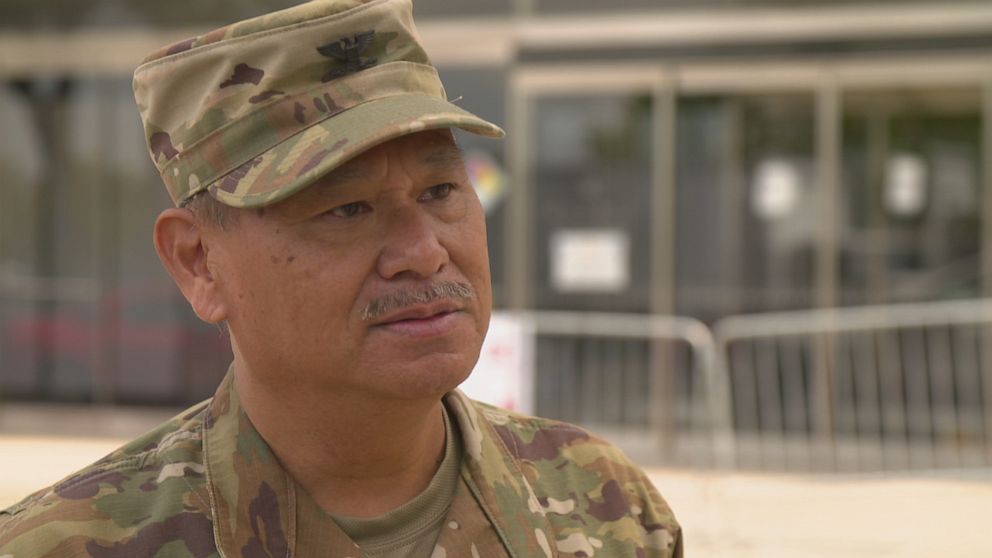
On March 1, a 39-year-old woman returning from travel in Iran became New York state's first case. COVID-19 killed 1,000 in New York City before the month was out.
New York City Mayor Bill de Blasio declared a state of emergency and, on March 20, made an urgent plea for help, calling for the "full mobilization of the United States military."
"This has been like war every week. You either had to find a way to survive or you would be overrun," de Blasio told "Nightline." "I said we are running out of people and we have got to find another way to do this. Can we turn to the military medical personnel on duty right now all over the country and bring them to the front?"
Within weeks, the federal government, working with the state of New York, sent thousands of troops to New York City.
The Army Corps of Engineers built makeshift hospitals at four locations, including the Jacob Javits Center in Manhattan.
Air Force Maj. Angela Murphy, another combat medic, was getting her hair done when she got her deployment call.
"My commander was like, 'I need you tomorrow,'" she told "Nightline." "I don't even know what to think or say. And I just came home. I went to my deployment box that I had made when I was active duty. And I just started getting everything out."
She even spoke to her parents about whether they had her power of attorney.
"Like, if something happens, I want to make sure everything is squared away, because we're going to New York City… Health care workers [were] dying," Murphy remembered.
This deployment would be a world apart from her last mission at Bagram Air Base in Afghanistan.
"For Bagram, I had six months of prep time to go in," she said. "Here we have like 16 hours and then we were there. Things were just happening so fast. It was like, you just have to go."
By April, New York state's COVID-19 cases surpassed China. The city was seeing about a dozen deaths every hour.
"The minute we got there, there was no traffic," Murphy said. "I've been there when you're like wall to wall people, you know. And so it was kind of eerie."
She was deployed to the emergency department at Lincoln Hospital in the Bronx, the city's most northern borough which has suffered the highest rates of COVID-19 deaths and hospitalizations in all of New York City.
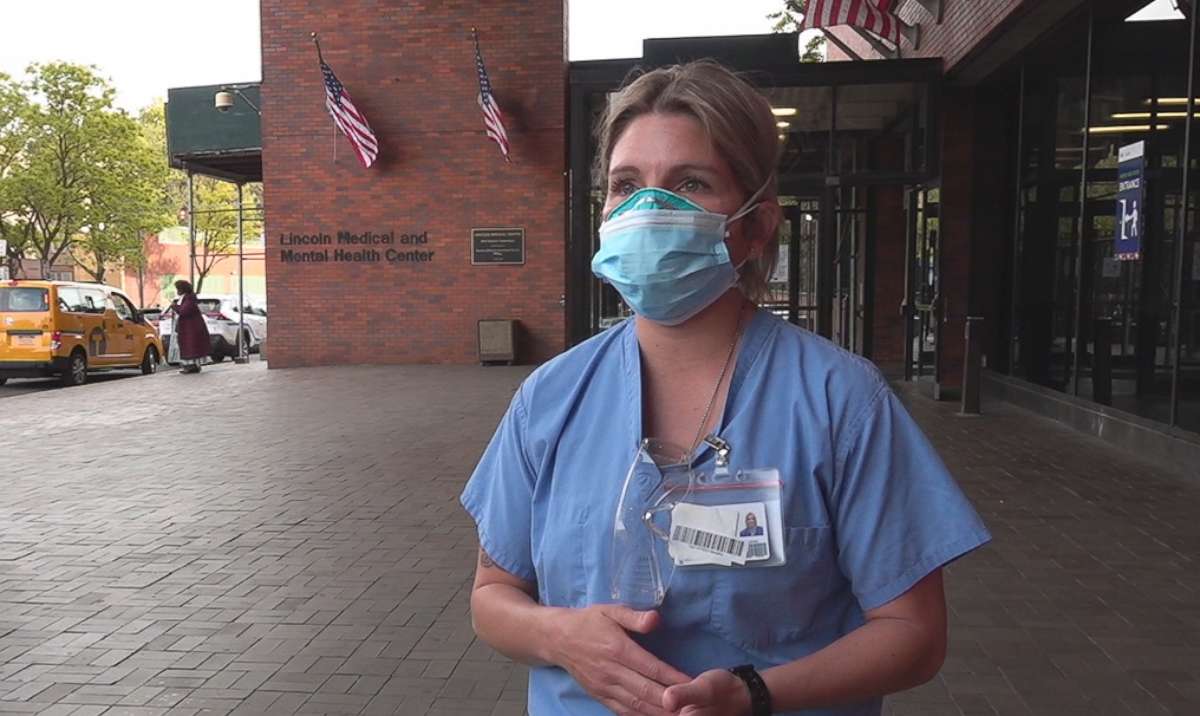
Murphy said she realized the severity of the outbreak the day she arrived.
"Just to see the amount of critically ill patients, rooms turned into [intensive care unit] beds. Everyone's crashing in the hospital. They call codes back to back to back," she remembered.Murphy said it was like dealing with a mass casualty event "every moment of every shift, every day for weeks."
In the emergency room, reacting fast was often a matter of life and death.
"They were so sick they wouldn't even realize it until [they] got to the hospital. So they may be struggling for their last breath," Murphy said.
She remembered treating one patient who had to be placed on maximum oxygen through a face mask. But that alone wasn't enough. Murphy said she and her team had to flip the woman onto her front to make it easier to breathe. It worked.
"I remember turning her back over and she didn't speak English, but I could understand a little bit of, you know, pieces that she was saying. And she was just like saying, 'Thank you, thank you, thank you,'" Murphy said. "She would take my hand and she would grab my hand and just hold it."
Murphy said the experience has been "overwhelming."
"Sometimes you just want to duck out and just cry. But you can't do that right now because you have other things to do."
Just a few miles away from the Bronx, Commander Thomas Shu deployed to Elmhurst in Queens. Early in the outbreak, it was one of the hardest-hit neighborhoods in the city.
"We're here to help relieve them, help decompress their staff who had been on it since the very beginning and that's why we were there," Shu told "Nightline."
Now with 28 years of experience in the Navy, he's provided life-saving care to those in need around the globe. But the front-line of COVID-19, he says, is entirely different.
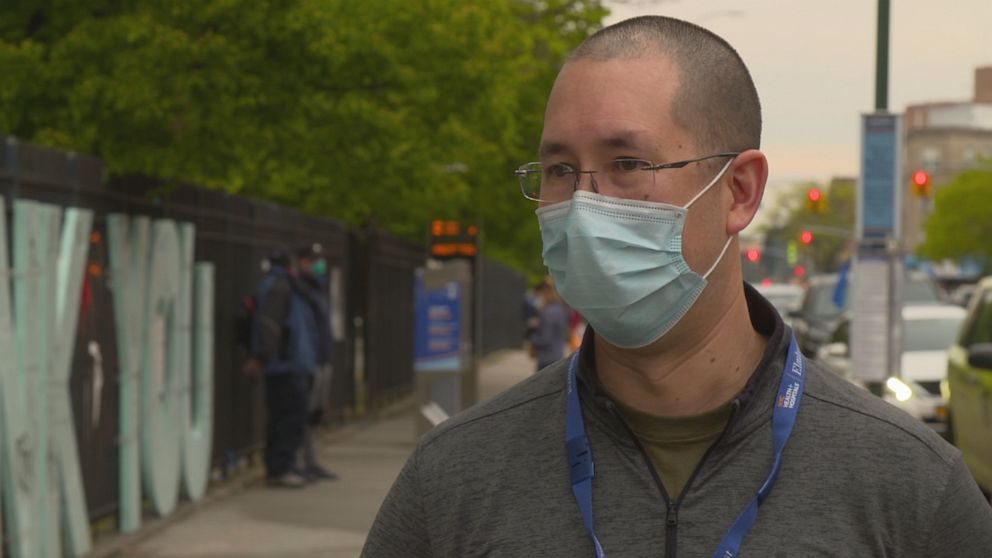
"If you are injured on the battlefield or have a combat casualty, and we could get you to medical care within that golden hour you had about a 96% survival rate. That really is different here," he explained. "When you're intubated, the mortality rates kind of skyrocket… The horror outcomes seemed to be more than the good outcomes."
By the end of April, the curve in New York appeared to be flattening and the situation in the city appeared to be stabilizing.
By early May, the Army hospital at the Javits Center fully closed. The USNS Comfort, docked on Manhattan's west side, was saluted and sent home. The worst-hit hospitals were finally seeing fewer patients.
First responders like Maj. Esther Nicole Cleggs-Burns made so many sacrifices to see this achieved.
"This isn't my first deployment," she told "Nightline." "I'm used to the exit, but not in that short period of time."
Within a day's notice, the Army Reservist headed to Elmhurst Hospital, leaving behind two young daughters and her husband back home in Alabama.
"My baby, she's 1, so she doesn't even realize I'm gone," Cleggs-Burns said. "My oldest, she's 6, so she's having a little more difficult time."
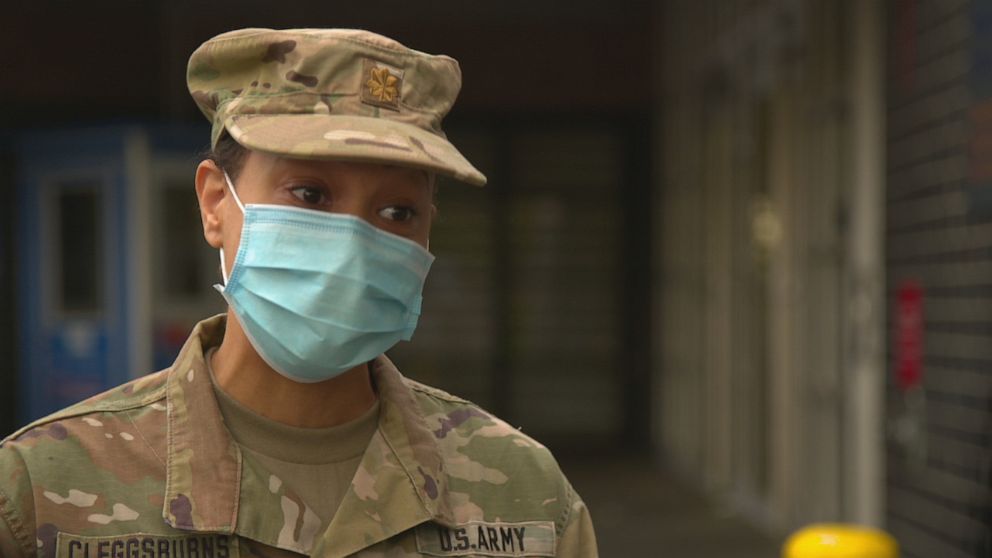
Like so many of us these days, her husband has his hands full navigating today's new normal.
"I definitely want to say like, I don't think military spouses get the credit that they deserve. But my husband, he is rocking it," Cleggs-Burns said. "My husband can't go to work because childcare is closed. School is closed. So he's at home every day, taking care of our girls."
The time away is perhaps made a bit easier with the gratitude of a city that has claimed these heroes as their own.
"When we arrived here to New York City, the people just showed us overwhelming love. A love that I can't even articulate," Cleggs-Burns said.
In March, quarantined New Yorkers had made a point to cheer, whistle and even bang pots and pans nightly at 7 p.m. to show their support for health care workers.
"It's an incredible thing to hear how appreciative everybody is here," Ramirez adds. "I had three people as I walked over here today thanking me for my service, thanking me for being here. Yesterday was my last day in the hospital at Lincoln. And my ward, my clinic gave me an applause… which, just from the heart. It was great."
That appreciation extends far beyond the 7 p.m. cheers.
Maj. Murphy and a few dozen others were honored in may in a special ceremony at Lincoln Hospital. This time, their colleagues and city hospital executives expressed heartfelt thanks for their sacrifices and their willingness to help carry such a heavy burden.
For Murphy, this deployment ended almost as suddenly as it began. She said she's taken so much away from her trip.
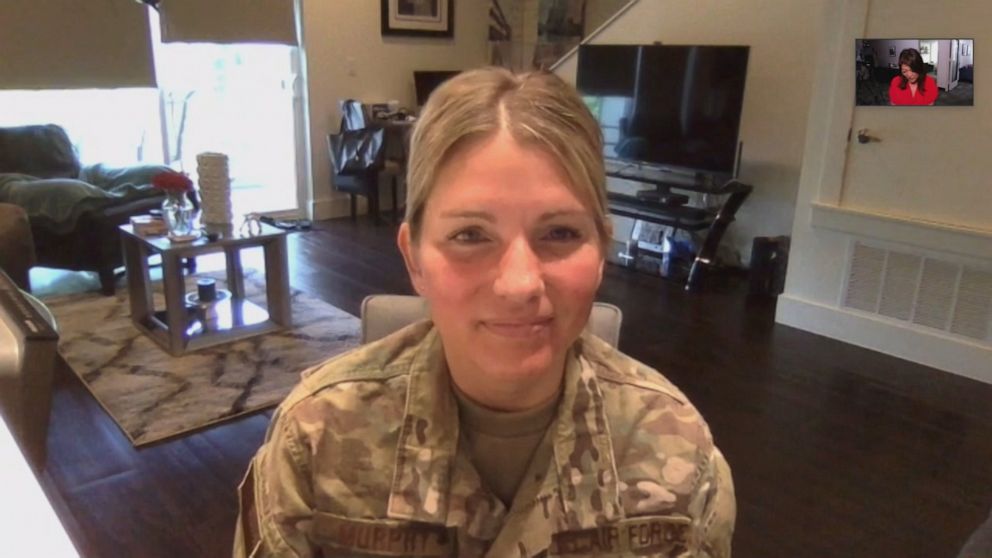
"From the fire department to the physicians to the nurses," she said. "But also, the bike rides we took, the Brooklyn Bridge, which is my favorite. I see the flag; the American flag. If you look back, you know, that is where the Twin Towers were… When I see the American flag, like I always get, you know, emotional about it."
She says the patients she cared for and their stories will stay with her "always."
Murphy bought a copy of The New York Times the day its front page listed the names and stories of some of the 100,000 people who died from COVID-19 in the U.S.
"I wouldn't look through the names… I didn't want to see a name I recognized. One day I'll pick it up and maybe I'll read it or maybe I'll just keep it how it is," she said. "When you hear something like that … you start thinking, 'Well, did I do enough? Could I have done more?'"
Nevertheless, Murphy says she would answer the call to help if a second wave of the virus were to strike.
"I couldn't not, you know, I mean, my God," she said. "It's just too hard for me to say no when your country needs you."
When Murphy arrived home in Austin, her boyfriend was waiting. The heartfelt reunion was two months in the making.
As for Ramirez, after so many deployments and so many months away in the last year, his return home to California was an opportunity to make up for lost time.
"I missed Halloween. I missed my wife's birthday. I missed Thanksgiving, I missed Christmas, missed New Years. I missed all the important days of our life, so to speak," Ramirez said.
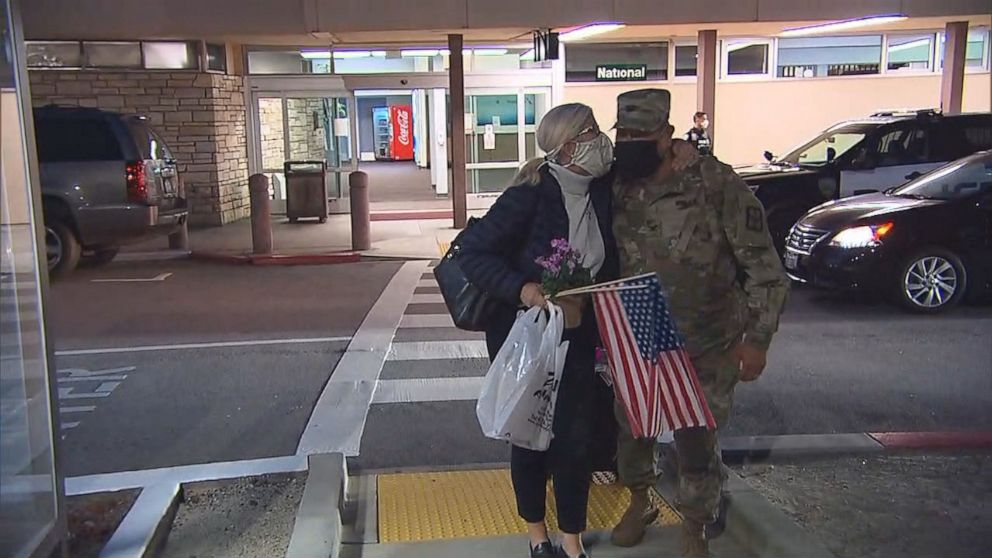
He even managed to bring his wife of 35 years flowers all the way from New York City.
"This is what I wanted to be in the military for, to try to be of service to my country," Ramirez said. "I know that if I had not deployed, I would have regretted it."




